|
|
|
Sort Order |
|
|
|
Items / Page
|
|
|
|
|
|
|
| Srl | Item |
| 1 |
ID:
152122
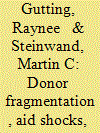

|
|
|
|
|
| Summary/Abstract |
Recent debates have focused on the negative role of the proliferation of foreign aid facilities and donor fragmentation for development outcomes and recipient country institutions. This article investigates an overlooked positive side effect of donor proliferation. With an increasing number of donors, exposure to negative aid shocks decreases, as well as the impact of such shocks on violent political conflict. Using data on 106 recipient countries for the years 1970 to 2008 and employing event history and mediation analysis, we find strong evidence that fragmentation significantly reduces the risk for political destabilization associated with aid shocks.
|
|
|
|
|
|
|
|
|
|
|
|
|
|
|
|
| 2 |
ID:
152115
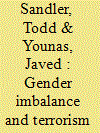

|
|
|
|
|
| Summary/Abstract |
This article investigates whether gender imbalance may be conducive to domestic terrorism in developing countries. A female-dominated society may not provide sufficient administration, law, or order to limit domestic terrorism, especially since societies in developing countries primarily turn to males for administration, policing, and paramilitary forces. Other economic considerations support female imbalance resulting in grievance-generated terrorism. Because male dominance may also be linked to terrorism, empirical tests are ultimately needed to support our prediction. Based on panel data for 128 developing countries for 1975 to 2011, we find that female gender imbalance results in more total and domestic terrorist attacks. This female gender imbalance does not affect transnational terrorism in developing countries or domestic and transnational terrorism in developed countries. Further tests show that gender imbalance affects terrorism only when bureaucratic institutions are weak. Many robustness tests support our results.
|
|
|
|
|
|
|
|
|
|
|
|
|
|
|
|
| 3 |
ID:
152116


|
|
|
|
|
| Summary/Abstract |
In this article, we explore how presidential risk orientations affect force employment decisions through an analysis of the use of unmanned weaponry during the Bush and Obama administrations. We hypothesize that the conception of risk plays an integral part in this choice of weaponry. In order to examine our hypothesis, we utilize the verbs-in-context system of operational code analysis to quantify the risk propensities of President Bush and President Obama during the Afghanistan War from 2001 to 2013. At the aggregate level, we find that the two presidents exhibit unique interpretations of risk with respect to manned versus unmanned weaponry. We further disaggregate our data to examine whether these preferences are fixed or fluctuate with situational changes. We find that President Bush’s risk calculations are influenced by a number of situational variables, highlighting the importance of changing decision contexts in explaining risk behaviors. President Obama’s risk calculations, on the other hand, remain constant over time lending credence to the importance of overall risk propensity in determining risk-taking behaviors. Our findings indicate that risk is an important variable in explaining the means of force employed during conflict, and that the source of this behavior can vary by leader.
|
|
|
|
|
|
|
|
|
|
|
|
|
|
|
|
| 4 |
ID:
152117
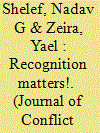

|
|
|
|
|
| Summary/Abstract |
Does international recognition of statehood affect support for territorial compromise among groups engaged in struggles for self-determination? We show that, contrary to skepticism about the impact of the United Nations General Assembly (UNGA), international recognition of statehood by the UNGA shapes mass attitudes toward territorial compromise. The impact of international recognition, however, is two-pronged. International recognition simultaneously increases support for partition as a strategy of conflict resolution and decreases support for compromise on the territorial terms of partition. We also suggest a logic to explain these impacts of international recognition based on the intuition that international recognition should improve the bargaining position of the newly recognized group. We demonstrate that international recognition has an impact on mass attitudes of groups in conflict using a combination of a panel survey and survey experiment assessing the impact of the 2012 UNGA recognition of Palestine. This study is the first to show that international recognition can shape mass attitudes toward conflict.
|
|
|
|
|
|
|
|
|
|
|
|
|
|
|
|
| 5 |
ID:
152121
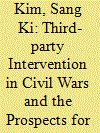

|
|
|
|
|
| Summary/Abstract |
How does third-party intervention in civil war influence citizens’ physical quality of life (QOL) after civil war? I find that the effects of intervention on postwar QOL depend on its type, unilateral intervention, and United Nations (UN) intervention. Unilateral interveners seeking self-interest tend to impede the improvement in postwar QOL particularly in terms of life expectancy and infant mortality rate. They are likely to do so through producing their protégé’s military victory or negotiated settlement, expanding their influence on postwar government, and resultingly forming a government less responsive to citizens’ hardship and reducing resources available for welfare. UN intervention on humanitarian grounds tends to promote postwar social development particularly in the fields of public health, although it has no significant effect on literacy rate. It is likely to do so by increasing resources available for postwar reconstruction, even though it goes where postwar social development is relatively difficult.
|
|
|
|
|
|
|
|
|
|
|
|
|
|
|
|
| 6 |
ID:
152120


|
|
|
|
|
| Summary/Abstract |
Under which circumstances do two democracies involved in a dispute decide to pursue binding conflict management? I argue that the existing literature is incomplete. In order to fully understand why democratic decision makers choose arbitration or adjudication over alternative strategies, it is necessary to consider the social trust levels of the general populations in both states. During arbitration and adjudication, states give up sovereignty in a crucial domain of foreign policy. This loss of control should be less problematic for high-trusting societies than their low-trusting counterparts. If citizens are generally optimistic about the behavior of strangers, they are more likely to place their country’s interests under the control of others. Furthermore, since the general population poses smaller constraints on decision makers in nondemocratic settings, I expect the effect of trust to be strongest in democratic dyads. An empirical analysis with a new data set of social trust provides support for this hypothesis.
|
|
|
|
|
|
|
|
|
|
|
|
|
|
|
|
| 7 |
ID:
152119
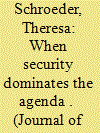

|
|
|
|
|
| Summary/Abstract |
The level of female representation has been found to lead to lower military spending and a lower level of state aggression. However, I argue that previous work has largely overlooked the impact of the international system on these three domestic characteristics. Specifically, the presence of an external threat from an interstate rival increases military spending, increases state aggression, and lowers female representation. Tests of this theory on democratic states from the years 1981 to 2007 find that the level of female representation decreases in states involved in an interstate rivalry and has a greater effect on female representation than factors routinely found to influence female representation. This article brings the international system into the discussion of factors that influence female representation while adding to previous literature on how the international system influences domestic politics.
|
|
|
|
|
|
|
|
|
|
|
|
|
|
|
|
| 8 |
ID:
152123


|
|
|
|
|
| Summary/Abstract |
Many theories attempt to explain why some countries democratize and others do not. Existing accounts, however, focus almost exclusively on structural factors and ignore individual leaders. In this article, we argue that leaders educated at Western universities are more likely to democratize than other leaders because Western education socializes leaders to prefer democracy and creates transnational linkages that alter the strategic calculus of democratization. Utilizing an original data set on the specific colleges and universities world leaders attended, we show that Western-educated leaders significantly and substantively improve a country’s democratization prospects.
|
|
|
|
|
|
|
|
|
|
|
|
|
|
|
|
|
|
|
|
|